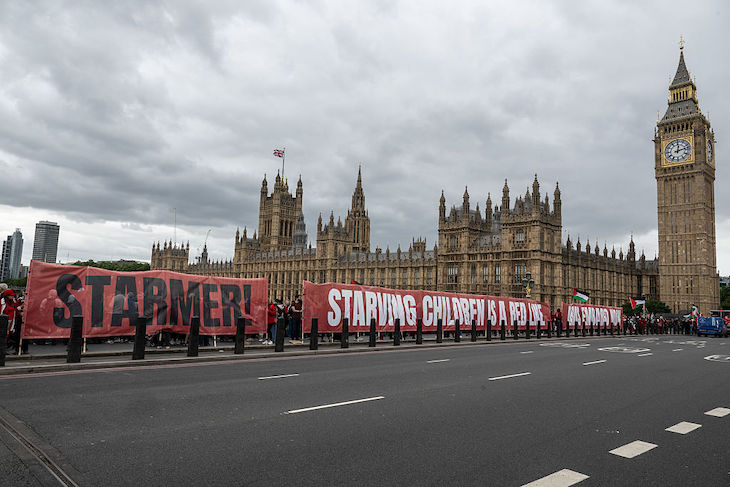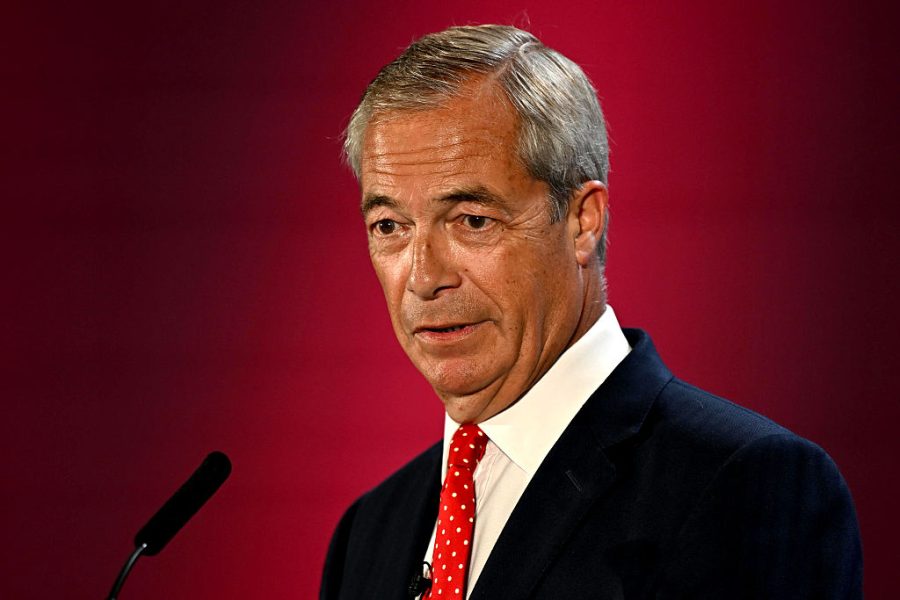Does the Metropolitan Police have more respect for the rights of aggressive protestors than it does for Parliament itself? That’s the unavoidable question after the Met handled the latest demonstrations outside the Palace of Westminster with the usual kid gloves.
If the police were not aware of the protestors’ plans, how could such a failure of open-source intelligence occur?
For several hours last Wednesday, many hundreds of Palestine Solidarity Campaign supporters gathered on the perimeter of the Palace of Westminster, effectively surrounding the Parliamentary Estate. As has become the norm at such events, the police appeared to be unwilling to enforce free and unobstructed access to Parliament so long as protest groups are able to mass sufficient numbers of individuals. It is an approach which compromises the Constitutional rights of Parliamentarians to make their way unimpeded to and from Parliament.
The culture of impunity which the various authorities – principally the Met – have created for disruptive protestors and criminals in the area around Parliament has been well documented by Policy Exchange in its report Tarnished Jewel. Lord Walney, the government’s former Independent Adviser on Political Violence and Extremism, has written to the Lord Speaker along with fifty-three members of the House of Lords, to express concern with how the Met are failing to prevent the intimidation, obstruction and harassment of Parliamentarians near to the Parliamentary Estate. But still the police fail to act.
As a former Detective Chief Inspector in the Met, I know that Parliament has passed an abundance of legislation – particularly in relation to the area around the Parliamentary Estate – which protects the public and Parliamentarians from obstructive or intimidatory protestors. The current generation of senior police officers are certainly not ignorant of the law; so why are they so unwilling to enforce it?
There are a number of laws the police could use to crack down on these protests:
Section 241 Trade Union and Labour Relations (Consolidation) Act 1992 states it is an offence to use violence or intimidate a person with a view to “compelling another person to abstain from doing or to do any act which that person has a legal right to do or abstain from doing”.
Section 7 Public Order Act 2023 protects parts of the “roads infrastructure” adjacent to the Palace of Westminster as part of the “key national infrastructure” – similarly Westminster Underground Station which is frequently used by protestors as a staging post to intercept Parliamentarians.
Section 143 Police Reform & Social Responsibility Act 2011 prohibits the obstruction of the passage of vehicles into or out of entrances into or exits from the Parliamentary Estate.
Section 137 Highways Act 1980 makes it an offence deliberately to obstruct the highway – which includes every road adjacent to the Palace of Westminster. The Supreme Court’s judgment in DPP v Ziegler [2021] UKSC 23 provides that the exercise of rights to assemble and speak may provide a lawful excuse for obstructing the highway, but only if there is no “serious disruption” to the rights of others.
Section 14 Public Order Act 1986 enables the police to apply conditions to a “public assembly” if the people organising the protest have a purpose to intimidate others “with a view to compelling them not to do an act they have a right to do”.
Given the police are well aware of the vast array of legal powers at their disposal why are they so unwilling to act? What and who are they afraid of?
The plans for this week’s protest were published on social media at 5pm on Saturday 31st May. In other words, more than eighty hours before the start of the demonstration. If the police were not aware of the protestors’ plans, how could such a failure of open-source intelligence occur?
If the police were aware, then to paraphrase US Senator Howard Baker on Watergate – what did Sir Mark Rowley and the Metropolitan Police know, and when did they know it?
The police regularly hold meetings with protest groups in advance of any disruption – but the nature of those discussions and the terms of any deal struck between them are rarely revealed. What was agreed that the protestors would and wouldn’t do? What did the Met, if only by omission, concede to the aggressive protestors?
That these cosy discussions are shrouded in secrecy is an approach which cannot be sustained. Is it any surprise that the public’s confidence in the police remains close to historic lows?
This week’s events represent but the latest episode in the police’s failure to deal with obstructive protestors in Parliament’s environs.
As activists continue their campaigns of disruption, police forces, prosecutors and the courts engage in a ‘balancing of rights’ exercise to adjudge whose rights, and which, are to be prioritised.
On one side are the rights of protestors to freedom of expression and freedom of assembly – neither of which are absolute but are subject to limitations “as necessary in a democratic society in the interests of national security and public safety”. On the other side the right of the ordinary person, or indeed the Parliamentarian on our behalf, to go about their daily lives and work.
The Met Commissioner has previously acknowledged that in the policing of past protests near Parliament the police have allowed demonstrators to get too close to the security perimeter. Yet this week’s episode shows that those lessons appear not to have been learned.
The interim report of the Speaker’s Conference on the security of candidates, MPs and elections, published this week, recognised that there is “at best inconsistent” understanding and awareness among police officers of the criminal offences related to preventing the harassment, abuse and intimidation of politicians.
The Defending Democracy Task Force, chaired by the Security Minister, Dan Jarvis MP, should examine as part of its current review what further steps the Government can take to protect Parliamentarians going about their duties in and about Westminster.
The Home Secretary, Yvette Cooper MP, must ensure the Metropolitan Police protects Parliament and Parliamentarians from this kind of disruption and obstruction. This is a national responsibility, well within her remit and where she should now take the lead.
She should direct His Majesty’s Inspectorate of Constabulary to conduct an inspection under section 54 (2B) Police Act 1996 into how the Met are managing protest in the proximity of Parliament.
The Home Secretary should also consider invoking the rarely used section 40 Police Act 1996 which enables her to direct the local policing body – in this case the Mayor’s Office for Policing and Crime – to take specific action to remedy the police’s failure. Given British policing’s traditional “operational independence”, this is considered by many insiders to be the “nuclear option”; but now that these protests are all too regularly impeding Parliamentarians going about their duties, it may well be that its time has come.
David Spencer is the Head of Crime and Justice at Policy Exchange and is a former Detective Chief Inspector in the Metropolitan Police







Comments